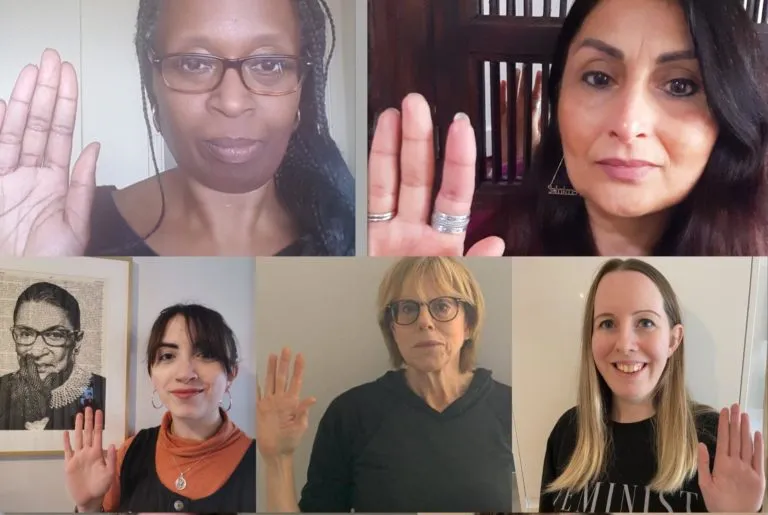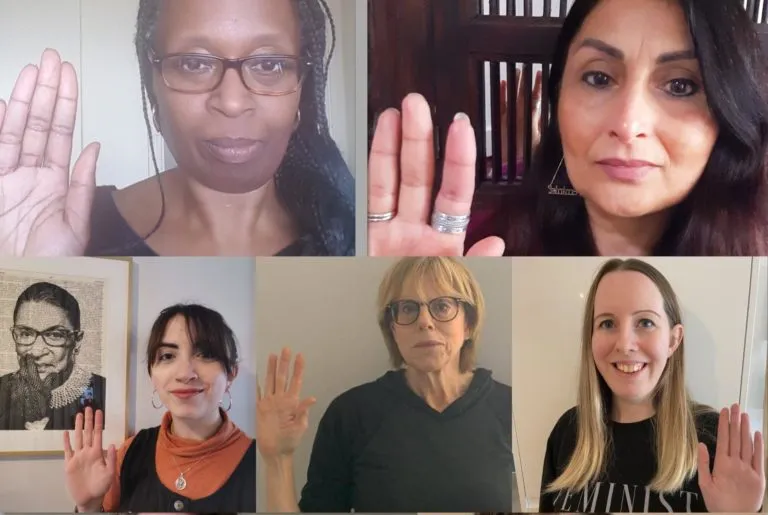Why social housing is a feminist issue
Published: by Bronya Smolen


A few of the brilliant women who work at Shelter, adopting the #ChooseToChallenge pose for International Women’s Day 2021
Women are hit hard by the housing crisis.
They are more likely to need to flee from domestic abuse, claim benefits, and have lower incomes. All of these factors increase the risk of homelessness, especially in a pandemic.
Add the intersection of being a woman of colour, and your chances of homelessness increase even more.
But there is a solution to ensuring everyone impacted by this housing emergency, including women, has a safe, affordable home. We must build more social housing.
This International Women’s Day (March 8 2021), we #ChooseToChallenge inequality in our housing system, and push for solutions.
Why is our need for social housing crucial in reaching equality?
The short answer? Women face the realities of the housing crisis every day. Whether it’s someone who’s fleeing domestic abuse but has nowhere to stay, or a hard working single mother who can’t feed her family and pay her rent.
Social housing offers both security and affordability, but there isn’t enough of it. So to address the barriers women face in England’s housing system, we need more of it.
The proof: statistics and the human impact
Domestic violence is a major cause of homelessness. The coronavirus (COVID-19) pandemic has a shone a spotlight on the issue of domestic abuse, but even official homelessness statistics show that domestic violence was one of the main causes of homelessness in 2019/20.i
The lack of decent, genuinely affordable social homes can also force survivors to choose between staying in an unsafe situation or becoming homeless in order to leave an abusive partner.
Being unable to afford a deposit on a home in the private rented sector, or worrying about the disruption on children by being forced to move away or into temporary accommodation makes this choice even harder.
Musurut Dar, our Senior Community Organiser for Birmingham, says: ‘In all the 20 years of undertaking community work in Birmingham, this is what women have said to me most. They fear becoming homeless if they leave their abusive relationship. They would ask, “Where would I go? I don’t want to end up homeless, I’ve got to think of my children”.’
One survivor told her: ‘I had to be homeless due to domestic violence before I could even get on to the social housing list. Birmingham desperately needs more social housing.’
The bottom line is that you can’t escape abuse if there are no affordable homes to escape to.
The benefit cap negatively impacts domestic abuse survivors
The benefits system should be there to protect people who need to escape their homes to stay safe.
However, the benefit cap can penalise women and their children who do so. For many survivors, leaving a situation of violence necessitates moving from being in a coupled family to a lone parent family. By leaving an abuser who is in work, many go from being in a ‘working household’, which is not subject to the cap, to an ‘out-of-work household’, which is.
Lone parent families with young children are particularly at risk from the benefit cap. Because in order to avoid the consequences of the cap, they must cover all childcare responsibilities and work enough hours single-handedly.
Women are more likely to claim benefits, therefore more likely to face discrimination when renting privately. Women also make up two thirds (67%) of Local Housing Allowance (LHA)ii, housing benefit claimants. So they are more likely to be impacted by unlawful ‘No DSS’ policies.
A landmark court ruling confirmed housing benefit discrimination was unlawful last summer, but the practice is still in the process of being stamped out. This won’t happen overnight.
We worked with a client, Jane*, to win this case. She is a hard-working single mum who lives with a disability. But became a victim of DSS discrimination when a letting agent told her they ‘have had a policy of not accepting housing benefit tenants’.
She said: ‘I felt very offended that after all those years, when I have prided myself on paying my rent, paying my bills, being a good tenant, it just meant nothing. When I realised we were going to be homeless because I couldn’t find anywhere, I felt sick to my stomach.’
Sadly, Jane’s experience is not uncommon for many women.
More women live in temporary accommodation
Women make up 61% of homeless adults living in temporary accommodation, but only half (51%) of adults in the English population.iii This means they had been placed in a hostel, hotel or accommodation on a temporary basis until a permanent home can be found.
What’s more, our report, Stuck In Limbo,iv found that the temporary accommodation available to women fleeing domestic abuse is repeatedly found to be inadequate and unsuitable, according to those with lived experience.
Crucially, the unaffordability of the housing market alongside a severe lack of social housing restricts feasible move-on options for survivors.
With 1.1 million people already on waiting lists for a social home, our housing shortage is only making the wait for a place to put down roots even longer.
It’s time for change
People thrive when they have a safe, warm place to call home, and it is everyone’s fight to ensure they have the chance to do so.
No one person experiencing homelessness is more important than another, but while systemic issues disproportionately impact one group of people, we must turn to solutions that address inequality for everyone’s benefit.
We must tackle inequality in our housing system.
That means stamping out discriminatory behaviour like ‘No DSS’ adverts and building a welfare system that is actually tied to the cost of living.
But long term, we must revolutionise our housing system, and stop relying on the broken market that is riddled with discrimination.
It’s time for change. It’s time for equality. It’s time for social housing.
Please sign our petition now!
Footnotes
i Official homelessness statistics show that in 2019/20 13% of cases where a homelessness relief duty was owed were due to domestic violence, making this one of the main reasons for homelessness
ii LHA Impact Assessment The effects of the reforms since 2011 https://england.shelter.org.uk/__data/assets/pdf_file/0005/1907870/Final_version_of_the_impact_briefing.pdf
iii Homeless and Forgotten: Surviving lockdown in temporary accommodation December 2020 https://assets.ctfassets.net/6sxvmndnpn0s/117BUNn9h9puF7ATy9TVV3/134b941d0fa8d161c9890e285f431417/TA_report_FINAL_PDF.pdf
iv Research: ‘Stuck in Limbo’ Experiences of women in Greater Manchester on surviving domestic abuse, homelessness and a housing system not working for them https://england.shelter.org.uk/professional_resources/policy_and_research/policy_library/research_stuck_in_limbo